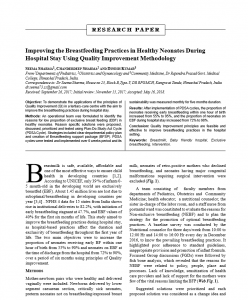
Breastmilk is safe, available, affordable and one of the most effective ways to ensure child health in developing countries. According to UNICEF, only 39 % of infants 05 month-old in the developing world are exclusively breastfed (EBF). About 1.45 million lives are lost due to suboptimal/breastfeeding in developing countries per year. NFHS 4 data for 15 states from India shows rise in institutional deliveries to 82.2%, with initiation of early breastfeeding stagnant at 47.7%, and EBF values of 40% for the first six months of life. This study aimed to improve the breastfeeding practices during hospital stay, as hospital-based practices affect the duration and exclusivity of breastfeeding throughout the first year of life. The two main objectives were to increase the proportion of neonates receiving early BF within one hour of birth from 55% to 90% and neonates on EBF at the time of discharge from the hospital from 72% to 90%, over a period of six months using principles of Quality improvement.
—
This special issue of Indian Pediatrics (September 2018; Volume 55: Number 9) highlights mechanisms that can support health care providers in using various quality improvement (QI) approaches and showcases some of the improvement projects undertaken in India by different teams.
The USAID ASSIST Project started working in India in September 2013; initially working directly with districts and facilities to help them learn how to use QI approaches to save lives. This work went well and the staff in these facilities were able to reduce perinatal mortality by 15% over 18 months. During this time, we met great partners from important organizations and institutions across India.
These institutions are now leading a growing movement to help more people apply QI methods to deliver care that prevents harm, improves outcomes, and meets the needs of the people receiving it through their own networks using domestic funding; continuing these lifesaving efforts after ASSIST technical support has ended.
The supplement shows important results of the ongoing QI work in these networks and shows how domestic QI networks, earlier supported by ASSIST, are now independently supporting and spreading the use of QI methods to provide better care.